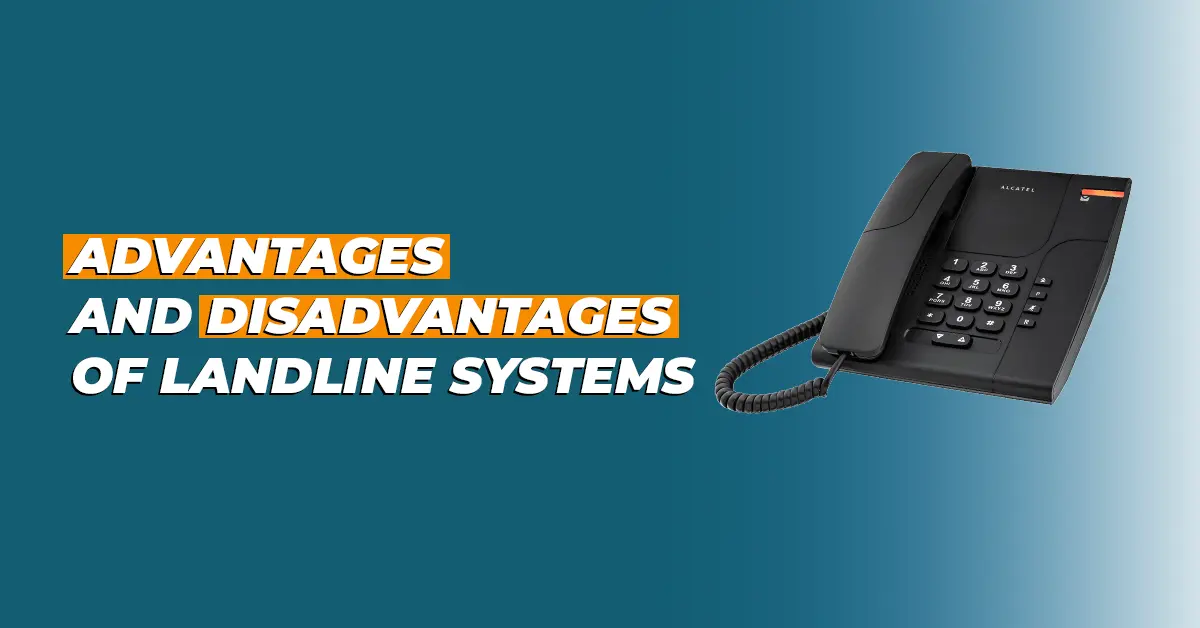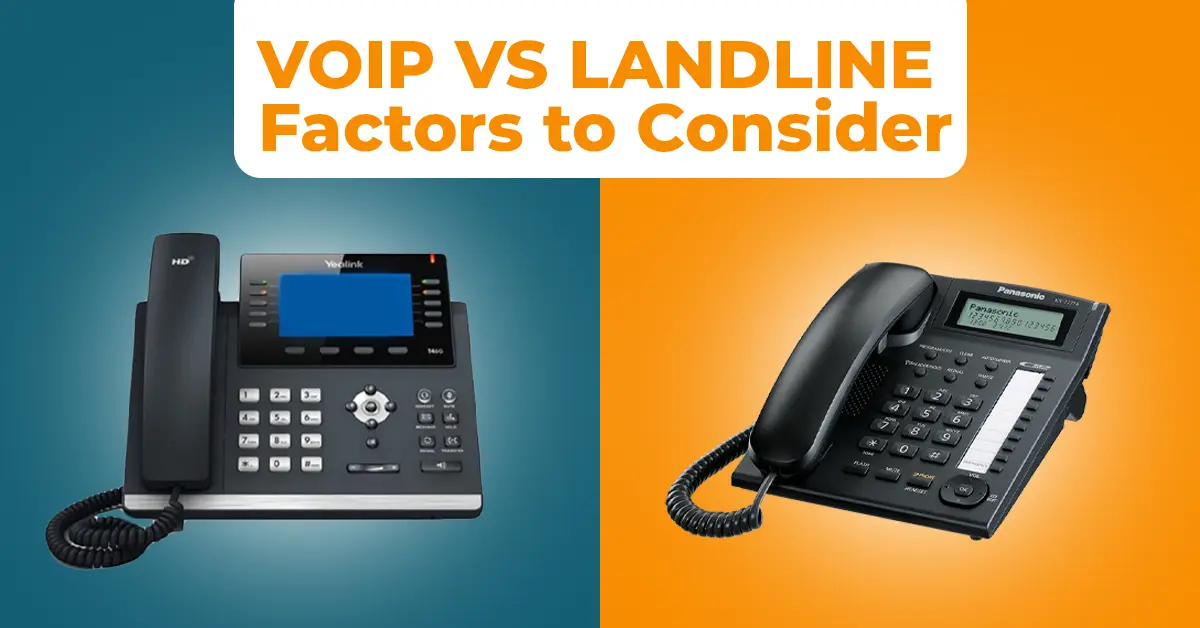Traditional landline phone systems ruled business communication throughout most of the 20th century. With the modern evolution, businesses have expanded, and their needs have increased. Modern businesses require effective communication techniques.
Voice over Internet Protocol (VoIP) Phone systems have opened new doors for business communication. However, does that mean a landline system is no longer required?
In this article, we will discuss the main differences between traditional landline systems and modern VoIP technology. Based on our analysis of both systems, we will conclude which system is best for modern business.
Understanding VoIP and Landline Technologies

Landline Phone System:
A landline phone system is also known as an analog phone system or plain old telephone service (POTS). It operates through dedicated lines or wires that are directly connected to the public switched telephone network (PSTN).
The system utilizes analog technology to convert sound waves into electrical pulses, which are transmitted through a network of copper wires.
VoIP Phone System:
VoIP phone systems operate solely through an internet connection for placing and receiving phone calls, offering enhanced features for business communication that are often accessible through dedicated apps.
VoIP system is also called a hosted or cloud phone service; that converts sound into data packets and transmits them to a VoIP provider, who manages calls between the Public Switched Telephone Network (PSTN).
How VoIP Works compared to traditional landlines?
Voice over Internet Protocol (VoIP) operates differently from traditional landline systems in several ways. Unlike landlines, which utilize physical wires and dedicated connections to transmit calls through the Public Switched Telephone Network (PSTN), VoIP relies solely on internet connectivity.
VoIP converts sound into digital data packets, then transmitted over the internet to the recipient. This transmission allows for more efficient and cost-effective communication and the integration of advanced features like voicemail-to-email, call forwarding, and video conferencing.
Additionally, VoIP calls can easily scale and adapt to meet the evolving needs of businesses. This feature makes them a preferred choice for modern communication solutions.
To understand the concept of VoIP vs. landline, it’s essential to understand the key terms first. Some important concepts of these two business phone systems are PSTN, VoIP, analog phone systems, and digital data packets. Explanation of these Key Terms and Concepts are,
1. PSTN (Public Switched Telephone Network):
The PSTN is the backbone of traditional landline communication. It encompasses a network of physical copper wires and switching centers facilitating individual voice calls.
Essentially, it’s the infrastructure that enables the routing of telephone calls across vast distances.
2.VoIP (Voice over Internet Protocol):
VoIP represents a revolutionary approach to communication, leveraging the power of the internet to transmit phone calls. Unlike traditional landlines, which rely on dedicated physical connections, VoIP converts voice signals into digital data packets that traverse the internet to reach their destination.
This technology offers enhanced flexibility, cost-effectiveness, and many advanced features.
3. Analog Phone Systems:
Analog phone systems, synonymous with traditional landlines, operate based on analog signals.
They convert sound waves into electrical signals transmitted through physical copper wires within the PSTN infrastructure. While reliable, analog phone systems lack the versatility and efficiency of VoIP.
4. Digital Data Packets:
In VoIP services, voice signals are digitized and segmented into digital data packets for transmission over the Internet.
These packets contain encoded voice data and routing information, allowing efficient and reliable communication.
VoIP optimizes bandwidth usage and ensures clear audio quality by breaking down voice calls into packets.
By familiarizing ourselves with these fundamental terms and concepts, we lay the groundwork for a deeper understanding of the difference between communication technologies, such as VoIP vs landlines.
Advantages and Disadvantages of Landline Systems

Advantages
1. Reliability and Stability of Landline Connections
Landline systems are used for unparalleled reliability and stability, particularly during power outages or adverse weather conditions. Where VoIP services may suffer from connectivity issues during internet disruptions, Landlines continue to function seamlessly, ensuring uninterrupted communication for businesses.
This reliability makes landline systems indispensable in critical situations where consistent communication is paramount, such as emergency services or infrastructure operations.
2. Superior Call Quality
Landline systems are renowned for their exceptional call quality, providing clear and consistent voice communication. Landline connections utilize dedicated physical wires to transmit voice signals.
This ensures minimal distortion and interference, resulting in high-fidelity audio and reliable call clarity. Businesses can rely on landline systems to deliver superior call quality, fostering effective communication with customers, clients, and colleagues.
3. Compatibility with Legacy Systems
Another advantage of landline systems is their compatibility with legacy communication infrastructure. Many businesses have invested in traditional landline equipment and infrastructure over the years, including PBX systems, analog phones, and wiring installations.
Landline systems seamlessly integrate with these legacy components, allowing businesses to leverage existing investments and infrastructure without the need for extensive upgrades or modifications.
This compatibility ensures continuity of operations and facilitates a smooth transition to new communication technologies, providing businesses with flexibility and cost savings in the long run.
Disadvantages
1. Limitations of Landlines in Terms of Mobility
While landline systems excel in reliability, they are hampered by inherent limitations in scalability and flexibility. Modifying a telephone line to accommodate growing business needs can be daunting, often requiring extensive physical installations and infrastructure upgrades.
Moreover, the rigidity of landline phone lines makes it challenging for businesses to adapt to dynamic communication requirements, such as remote work arrangements or rapid expansion into new markets.
This lack of scalability and flexibility constrains businesses striving to remain agile and responsive in today’s fast-paced environment.
2. High Costs Associated with Maintenance and Long-Distance Calls
One of the primary drawbacks of landline systems is the substantial costs associated with maintenance and long-distance calls. Maintaining a complex physical infrastructure network, including copper wires and switching equipment, incurs significant business expenses.
Additionally, long-distance calls made through landline systems often result in excessive charges, further burdening companies with hefty communication expenses. These high costs can strain the financial resources of businesses, particularly smaller enterprises operating on tight budgets.
3. Limited Features:
One significant drawback of landline systems is their limited feature set compared to VoIP technology. Traditional landline systems typically offer basic calling features such as call waiting, caller ID, and voicemail.
However, they lack the advanced functionalities and flexibility provided by VoIP systems, such as call routing, voicemail-to-email transcription, video conferencing, and mobile integration.
This limitation restricts the ability of businesses to adapt to evolving communication needs and leverage innovative features to enhance productivity and efficiency.
Additionally, as businesses increasingly rely on advanced communication tools to streamline operations and improve customer service, the limited feature set of landline systems may hinder competitiveness and hinder the ability to meet the demands of modern business environments.
Exploring the Benefits of VoIP

To make the right decision for your business, it’s important to know the pros and cons of VoIP and a landline phone system. In this section, we will explore the benefits of VoIP.
1. Cost-Effectiveness: Lower Setup and Maintenance Costs Compared to landlines
VoIP presents a cost-effective alternative to traditional landline systems, offering lower setup and maintenance expenses.
Unlike landlines, which require the installation of physical infrastructure such as copper wires and switching equipment, VoIP relies on existing internet connections, reducing initial setup costs significantly.
VoIP systems typically require less maintenance than landlines, as there are fewer physical components to maintain and repair. Businesses can save on operational expenses by opting for VoIP, making it an attractive option for organizations aiming to streamline their communication expenditure.
2. Scalability: Ability to Easily Scale Up or Down Based on Business Needs
One key advantage of VoIP Phones is their scalability, which allows businesses to adjust their communication infrastructure according to fluctuating demands.
Unlike traditional landlines, which may require substantial investments in infrastructure upgrades to accommodate growth, According to business needs VoIP systems can easily scale up or down.
Businesses can seamlessly add or remove lines and features with minimal disruption, whether expanding operations or downsizing. This scalability ensures optimal resource utilization and flexibility in adapting to evolving business requirements.
3. Flexibility: Integration with Mobile Devices and Remote Work Capabilities
VoIP’s inherent flexibility enables seamless integration with mobile devices and facilitates remote work capabilities, aligning with modern communication trends.
Employees can utilize VoIP applications on their mobile phones, tablets, or laptops to make and receive calls from anywhere with an internet connection. This mobility enhances productivity and accessibility.
It empowers employees to stay connected and collaborate effectively, regardless of location. VoIP also supports features such as video calling and conference calls, enabling efficient communication among remote teams and flexible work arrangements.
4. Advanced Features: Call Routing, Voicemail-to-Email, and Analytics
VoIP systems offer advanced features that enhance productivity and efficiency in business communication. These features include
- Call routing- It enables calls to be automatically directed to the appropriate department or extension, streamlining call-handling processes.
- Voicemail-to-email transcription- It allows users to receive voicemail messages directly in their email inbox, facilitating timely response and organization.
- Analytics– It provides valuable insights into call data and communication patterns allowing businesses to track metrics such as call volume, duration, and frequency.
These advanced features empower businesses to optimize their communication processes and make data-driven decisions, ultimately improving overall efficiency and effectiveness.
VoIP vs Landline: Factors to Consider

| Factors | Landline Systems | VoIP Systems |
| Reliability | Traditional landline systems are often lauded for their stability, particularly during power outages. | VoIP systems have improved reliability significantly, provided a stable internet connection exists. |
| Cost Effectiveness | Landline systems may incur higher setup and maintenance costs | VoIP systems typically offer lower overall expenses due to reduced hardware requirements. |
| Scalability | Landline system has limited scalability without extensive infrastructure upgrades | VoIP systems excel, allowing for easy expansion or contraction of services like international calls without extensive infrastructure upgrades |
| Flexibility | Landline system has Limited flexibility, mainly tied to physical infrastructure | VoIP systems offer greater flexibility by integrating seamlessly with mobile devices and supporting remote work capabilities. |
| Advanced Features | Basic features, fewer options for customization | VoIP systems often provide a broader range of features. |
Boost your business phone system with VoIP Elements.
As businesses adapt to the evolving communication landscape, integrating VoIP elements into their phone systems becomes increasingly vital. VoIP offers many benefits that can significantly enhance operational efficiency, reduce costs, and boost productivity.
By incorporating VoIP elements, businesses can streamline communication processes, enabling seamless connectivity across various devices and locations. When you consider the benefits of VoIP vs. landline, you can see that VoIP allows for easy integration with mobile devices, empowering employees to stay connected while on the go.
This flexibility enables remote work capabilities, facilitating collaboration among distributed teams and enhancing overall efficiency.
Moreover, VoIP systems typically have advanced features such as call routing, voicemail-to-email transcription, and analytics, providing businesses with greater control and insight into their communication workflows. These features not only improve communication efficiency but also contribute to informed decision-making and resource optimization.
Furthermore, VoIP systems often offer cost savings compared to traditional landline systems, thanks to lower setup and maintenance costs and competitive pricing for long-distance calls. This cost-effectiveness allows businesses to allocate resources strategically, driving overall profitability and sustainability.
Integrating VoIP elements into business phone systems is not just a technological upgrade but a strategic imperative to navigate the complexities of modern communication and unlock competitive advantages in today’s dynamic business landscape.
Wrapping Up
The comparison between VoIP and landline systems reveals a dynamic landscape of communication technologies, each with its own set of advantages and disadvantages.
While traditional landline systems offer reliability and superior call quality, they are constrained by limitations in scalability, flexibility, and feature offerings.
On the other hand, VoIP systems present cost-effectiveness, scalability, flexibility, and advanced features, making them an attractive option for modern businesses striving for efficiency and innovation in communication.
If you feel a VoIP system is required to enhance your business efficiency, then take a step now. Look for our services on VoIPElement and contact us now for further assistance.


